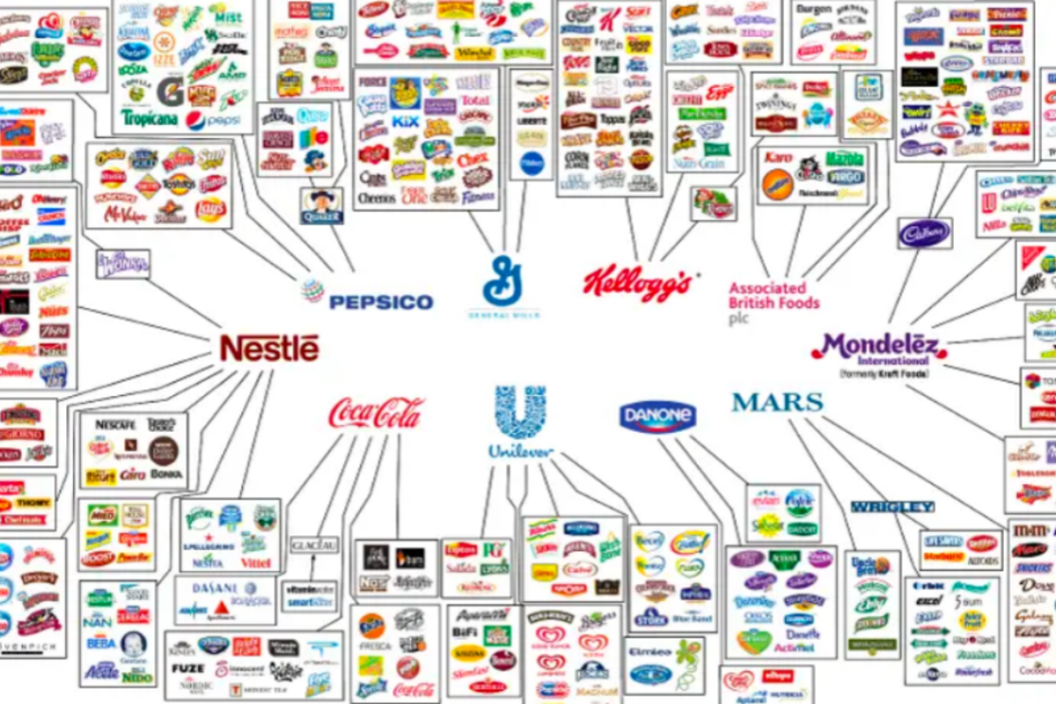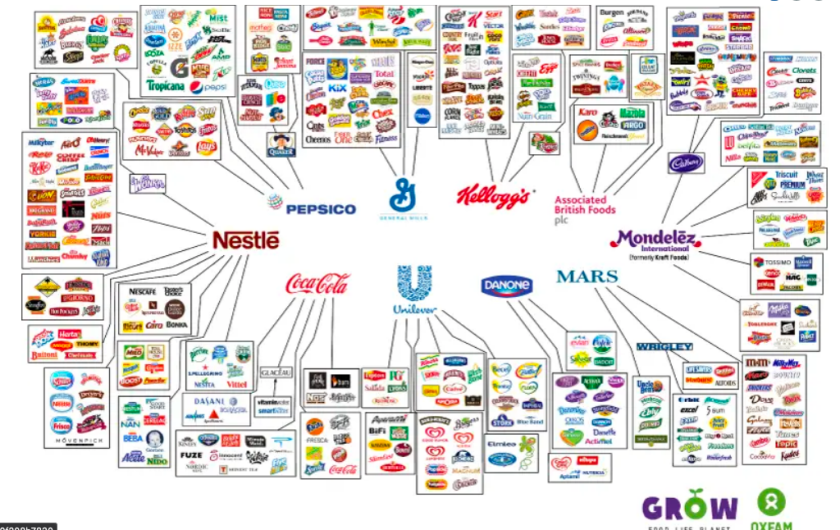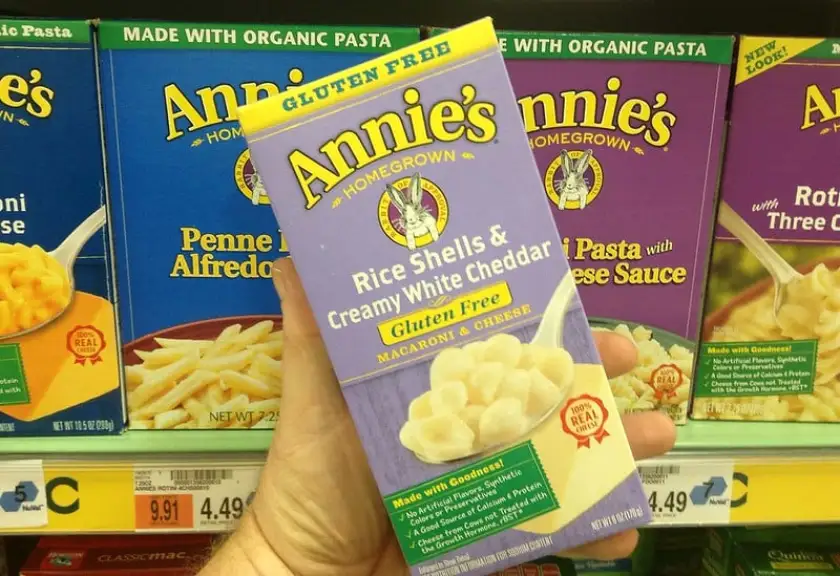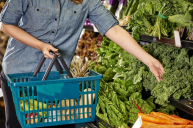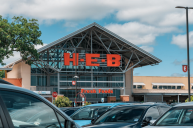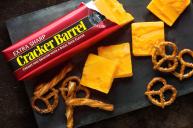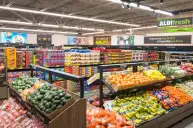Would it freak you out to know that 10 companies control almost everything you buy? It seems like these 10 food companies — Kraft, Coca-Cola, Nestle, P&G, Johnson & Johnson, Unilever, Pepsico, General Mills inc, Kellogg's, and Mars — are involved in almost every major food and beverage brand you see on the grocery shelves in North America. From Pringles to Pillsbury, they own all the food products you buy and love.
This is news to me! I mean, I've always thought of Ben & Jerry's ice cream as a chain of small businesses... until I learned they were owned by Unilever. And wouldn't popular candy bars like Snickers, Kit Kat, Milky Way, and Twix all be in competition with each other? Nope, their parent company Mars profits from them all.
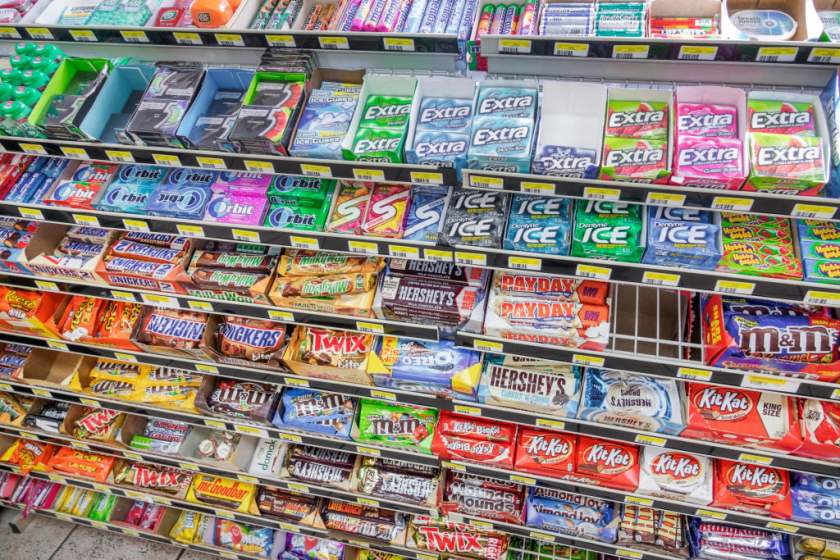
Getty Images/Nadya So
This monopolization extends to every kind of food, from desserts to produce to dairy products. Dairy Farmers of America or DFA owns Dairy Maid Dairy, Country Fresh, Cache Valley, and so many more. As for Nabisco, they own Oreo, Chips Ahoy!, Honey Maid, and essentially every well-known cookie and cracker in the world!
Finally, I knew that the Coca-Cola company owned water company Dasani, and Pepsico, inc owned its competitor Aquafina. But it's not just soft drinks; I had no idea that Pepsi's reach extended to food brands like Doritos and Quaker Oats.
Business Insider breaks it all down, mapping out the network of the largest food and beverage companies in the world.
The 10 Food Companies That Own Basically Every Grocery Item
Each of these companies earns billions of dollars of revenue every year from the global food industry, not just the United States alone. Far and wide, their products are on shelves in Brazil, Canada, China, Switzerland, Japan, France, Germany, and more. As a result, they have grown so large and powerful that they are more than just food companies.
The More Money You Have, The More Power
Their actions, decisions, and policies have a huge impact on our diet and grocery shopping decisions. Not to mention their worldwide impact, both environmentally and their role in climate change. From pioneering food engineering legislature to adding to the global workforce to affecting food processing, these largest food companies wield their influence for both negative and positive outcomes across the world.
And when there is change in these food companies, it's often kept within the family, so to speak. For example, Kraft bought Danone and Cadbury to expand its snack food reach, the in 2012 Kraft spun off some the snack food and confectionery brands into Mondelez International. And of course, Kraft went on to merge with Heinz in 2015 to make Kraft Heinz.
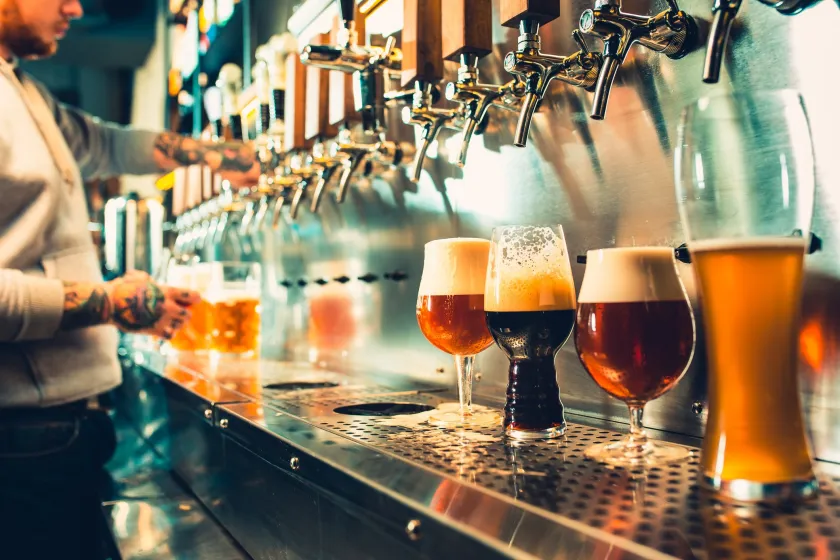
Getty Images/master1305
And it's just not just prevalent in the food industry. The food service and beverage industry is just as guilty, with Anheuser-Busch InBev collecting craft beer brands like candy to build out their lineup and Japanese company Suntory acquiring everything from Maker's Mark bourbon to Canadian Club whisky.
This phenomenon also extends to other products, showing how wide-spread the problem is. Proctor & Gamble, for instance, had a revenue of $65 billion in 2017 and owns countless brands like Tide, Charmin, Pampers, Downy, Gillette and Crest. Johnson & Johnson is another example, owning brands like Band-Aid, Tylenol, Clean & Clear and Aveeno.
Organic Brands Are In On It Too
While you might think that high-quality organic brands or specialized foods, like popular gluten-free or allergy-friendly foods aren't part of the brand bundling, we're sorry to burst that bubble. For example, ConAgra Brands owns Earth Balance (popular vegan butter substitute) and Udi's Gluten Free breads. Annie's Homegrown Pasta (with the cute bunny mascot) was bought by General Mills in 2014.
Is it a bad thing to have so few companies controlling the food supply? It may depend on what angle you view the question from. The small companies who have been brought into larger brand umbrellas appreciate the additional funding and product reach (it's hard to get products into grocery stores, especially in prime shelf placement). More niche brands, like those that provide gluten-free food, have gained popularity and production capacity, meaning they are easier to find and less expensive to buy.
But there's also the fact that so few companies controlling our favorite food brands means they have a great deal of power over the supply chain. And because they are beholden to shareholders instead of customers, they may choose to use cheaper ingredients and change recipes without telling customers.
I personally feel that the more transparency, the better. It's important for consumers to know who their money is going to and what types of practices business have when it comes to ingredients and worker conditions. However, with so many brands being owned by the same huge company, it's hard to know who's behind the product in question and who you're giving your money to.
How Well Do Americans Know Who Owns Which Brands?
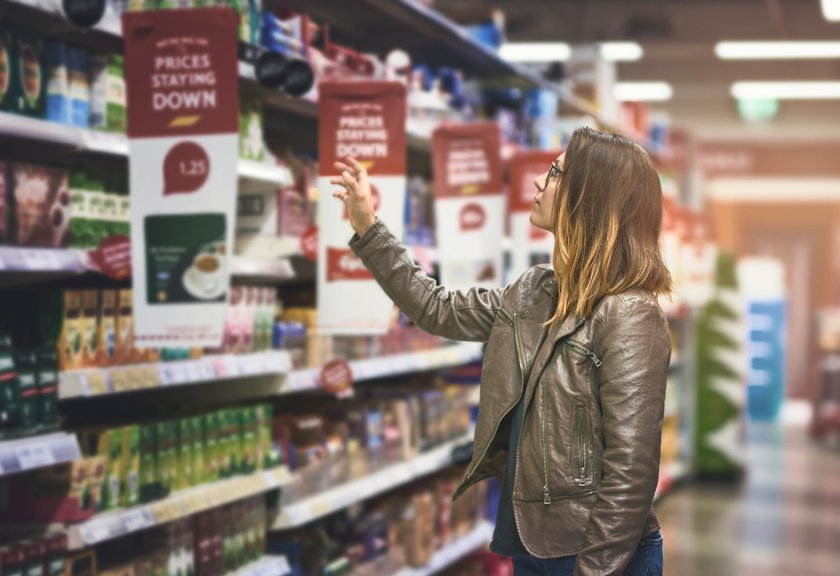
Getty Images/PeopleImages
After discovering how a few giant companies own all of the popular brands, Capital One decided to do a survey of 3,000 Americans to see how well we know which companies own which brands. The survey showed that most Americans have no real idea who owns the brands they use. Along with this, half of Americans make decisions based on which brands sound organic.
So, although consumers are attempting to make healthy choices, they're actually just buying a product that's been marketed differently. For instance, over half of Americans were found to believe that Honest Tea is owned by a tea company, which likely has led them to buy more of its products. You can see the results of the survey at Capital One Shopping. Would your answers have been any different?
If you're concerned with so few companies controlling so many brands, you can seek out smaller, independent brands, usually found at local or smaller grocery stores. Just don't be surprised when you hear they've been bought by a larger company.
